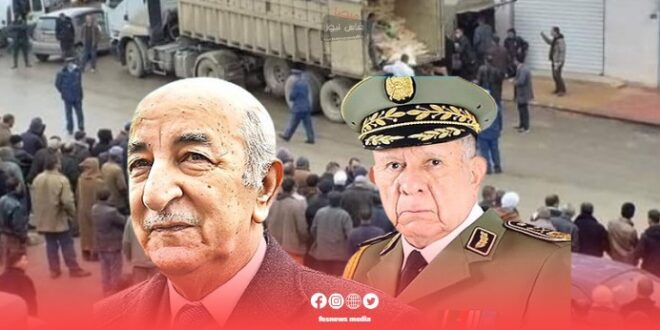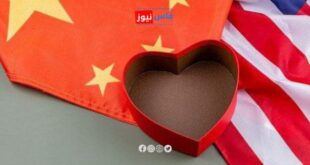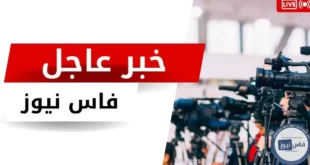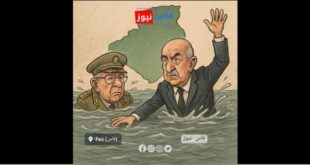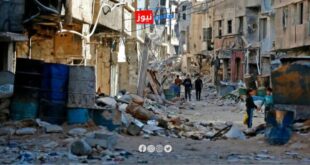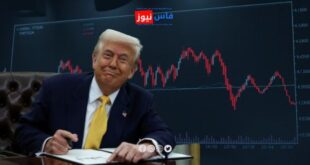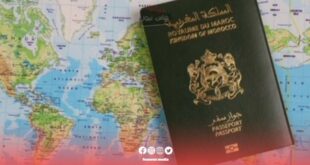Opinion Article – The natural size of Algeria is what it was before it was occupied by France in 1830. This occupation lasted from 1830 to 1962, i.e. one hundred and thirty-two years (132 years) in total. It should be noted that the French occupation came after the Ottoman occupation, which lasted for more than three centuries (1516-1830), more than the time the people of the cave slept. These historical facts are useful for those who want to understand Algeria with its geography, population, state, characteristics, and mentality.
Algeria, which today is the largest country in Africa, was not so when it was occupied by France. How did it become the size it is today? The answer lies, on the one hand, with the colonizing country and, on the other hand, with historians and researchers of North African history. History books, historical documents and maps confirm that French colonization created the current Algeria with its geography and borders by carving out vast territories from countries that have land borders with its North African territory, thinking that Algeria would remain one of its overseas territories. France carried out this aggressive act of expansionism between the late 19th century and the first half of the 20th century. Thus, the colonialist extended the area and borders of its African province at the expense of its neighbors: Morocco, Tunisia, Libya, Mali and Niger: Morocco, Tunisia, Libya, Mali and Niger. This simply explains the vastness of Algeria’s current size.
Today, however, there are indications of a qualitative shift in geopolitical, ethnic, social, demographic and other factors. Unless this situation is dealt with wisely and prudently, the situation could explode at any moment, both internally (the Kabyle issue, the Tuareg issue, the Azawad issue…) and on the borders, which are all inflamed (the relationship with Libya and with the Sahel countries…). All this indicates that sooner or later, Algeria will return to the size it was before it was occupied by France. The latter has enough archives to correct its historical mistake and do justice to the affected countries by returning the stolen land to its people. Voices have begun to be raised, here and there (and this is not new), to demand this historical right, which cannot be abolished neither under the pretext of the statute of limitations, nor under the pretext of fait accompli, nor by adhering to the “principle” of the borders inherited from colonialism (see our article entitled “Calling for the retention of the borders inherited from colonialism is an invitation to erase historical truth”, published in the newspaper “Socialist Union” on March 10, 2023).
This principle, which Algeria adheres to, concretely confirms that the Algerian regime is merely an heir to French colonialism and its role in guarding and protecting the maps of North Africa that the colonialists created and imposed as a fait accompli. This is not surprising; Algeria is still, in a sense, a French subject, not to say a French colony; it does not have a document proving its independence; it has barely been granted conditional autonomy; thus, the Algerian regime is limited to guarding the land that France has seized and annexed to the former Algerian Empire.
As for saying that this land is watered with the blood of martyrs, this statement is nothing more than a justification of the occupier’s action and a pretext for trading in the blood of martyrs. Algeria is the only country in the world that trades its martyrs and boasts of their million numbers (Abdelmadjid Tebboune speaks of five million and 630,000 martyrs), while those who know the truth speak of a few tens of thousands.
If we recall the logical rule that says: “What is built on nullity is null and void,” and reinforced by the Moroccan proverb that emphasizes that “Mexico is naked,” our answer to every Algerian who adheres to the principle of maintaining the borders inherited from colonialism is that this principle is logically, mentally and morally unacceptable, because these borders were built on incorrect grounds and are therefore invalid. They were established by French colonialism on the land of others, after seizing it by force for the purpose of expanding the colony and strengthening its influence by exploiting the wealth of the land and tightening control over its inhabitants. However, according to legal, historical, and moral rules, what the French colonialists did is in the category of prescribed theft. Since the stolen property has appeared and its rightful owner has emerged, the thief must return the stolen property to the rightful owner; in other words, he must return the land to its people. The principle of boundaries inherited from the colonialists is nothing more than a right that is meant to be a falsehood; the one who adheres to it is in the position of the naked man, or the one who covers up the theft or is a participant in the theft.
When we defend the territories that France stole from the neighbors of its African province and call for the return of Algeria to its natural size, it should not be understood that we are adopting or defending disintegration scenarios, but only that we want to highlight the right of Algeria’s neighbors to recover their territories that France usurped and annexed to its North African territory. Morocco realizes that one of Algeria’s objectives in creating the Moroccan Western Sahara issue is to distract or dissuade it from claiming its Eastern Sahara.
However, developments on the international level and on the ground have proven the Algerian regime’s shortsightedness and stupidity. The stone that Houari Boumediene wanted in Morocco’s shoe has turned into a solid rock on Algeria’s chest and a nightmare that the regime does not know how to get rid of; the best proof of this is what President Abdelmadjid Tebboune recently stated about the lack of prospects for young people born in the Tindouf camps, meaning, here, Southern Algeria. Tindouf has become a state within a state. How will Algeria get out of this dilemma, especially since most of those in the Tindouf camps are not from the Moroccan Sahara?
I thought of concluding this article by referring to an interview of the first writer of the Socialist Union of Popular Forces, Mr. Idriss Lashkar, published in a respected Arab media outlet called “The New Arab”. I thought of this reference because of the rational and practical proposals and ideas addressed to the Algerians, concerning their internal issues, whether at the level of the Kabylia region or the Azawad region.
However, when I recalled the plethora of official statements hostile to our country, from the speeches of the President of the Republic to the ministers and party leaders to the official and unofficial media, it became clear to me that the “new Algeria” no longer has any sane or rational people who can understand the words of the Socialist Union’s first secretary, so I abandoned the idea.
I would like to tip my hat, on the one hand, to the professors of international law and international relations who participate in televised debates with their Algerian counterparts (France 24, for example) and, on the other hand, to the social media activists who organize live debates (livats) with callers from Algeria. I tip my hat to these Moroccans for their patience and tolerance of the ignorance, stupidity and foolishness of their Algerian interlocutors, even if some of them are doctors, researchers, specialists and experts, which confirms that the military regime has succeeded in domesticating and taming an entire people, except for those who take God by the hand.
By : Mohamed Enfi
Source : Fes News Media
 فاس نيوز ميديا جريدة الكترونية جهوية تعنى بشؤون و أخبار جهة فاس مكناس – متجددة على مدار الساعة
فاس نيوز ميديا جريدة الكترونية جهوية تعنى بشؤون و أخبار جهة فاس مكناس – متجددة على مدار الساعة

